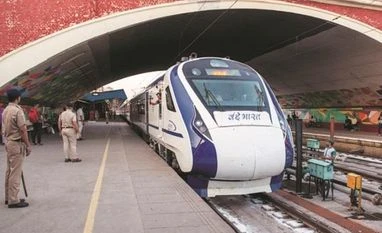Till 02:58 PM; around 251 million equity shares representing 12 per cent of total equity of RVNL changed hands on the NSE, the exchange data shows.
RVNL mostly works on a turnkey basis and undertakes the full-cycle of project development from conceptualisation to commissioning including stages of design, preparation of estimates, calling and award of contracts, project and contract management, etc.
More From This Section
RVNL follows an asset light business model, which helps keep its fixed asset part lower, helping it to keep its balance sheet stress free, and resulting in lower inventory days. RVNL is a project executing agency working for and on behalf of MoR (Ministry of Railways) and has a strong order book visibility which is likely to play a key role in the development of railway infrastructure in India.
The management expects revenue to grow at CAGR of over 20 per cent in the coming few years on the back of strong order book and new order inflows.
Last month, a joint venture of Russian firm Transmashholding (TMH) and RVNL emerged as the lowest bidder for the manufacture and maintenance of 200 lightweight Vande Bharat trains. The consortium made a bid of around Rs 58,000 crore, with the cost to manufacture one train set at Rs 120 crore.
Earlier, this month, RVNL in consortium with Siemens India, emerged as the lowest bidder (L1) for Mumbai Metro line 2B of Mumbai Metropolitan Region Development Authority (MMRDA). The project is estimated to cost around Rs 378.16 crore.
Meanwhile, Indian Railways have prepared a National Rail Plan (NRP) for India – 2030. The Plan is to create a ‘future ready’ Railway system by 2030. The NRP is aimed to formulate strategies based on both operational capacities and commercial policy initiatives to increase modal share of the Railways in freight to 45 per cent. The objective of the Plan is to create capacity ahead of demand, which in turn would also cater to future growth in demand right up to 2050 and also increase the modal share of Railways to 45 per cent in freight traffic and to continue to sustain it. This could provide a big uptick to the orders and revenue of RVNL.
RVNL has now started participating in tenders of other countries as well. The experience of around two decades in India of being one of the lead execution agency for railway projects would help the company to evaluate, bid and execute projects in other countries. Many counties across the world are looking at expanding and improving their rail network. This would also diversify its revenues geographically, reducing its risk and dependence on Indian Railways.
The Government has recently shown intention to introduce competition among PSUs for allotment of work by the Railway Board. This could impact order flows to some extent. The thrust on improving the infrastructure for rail transportation by adding new lines, doubling existing lines, electrification, etc. would continue to provide constant flow of business for the company. Execution of larger projects on a low base could propel growth higher in coming years, analyst at HDFC Securities said in their January 2023 report. The stock, however, is trading above its bull case fair value of Rs 86.50 per share.
)